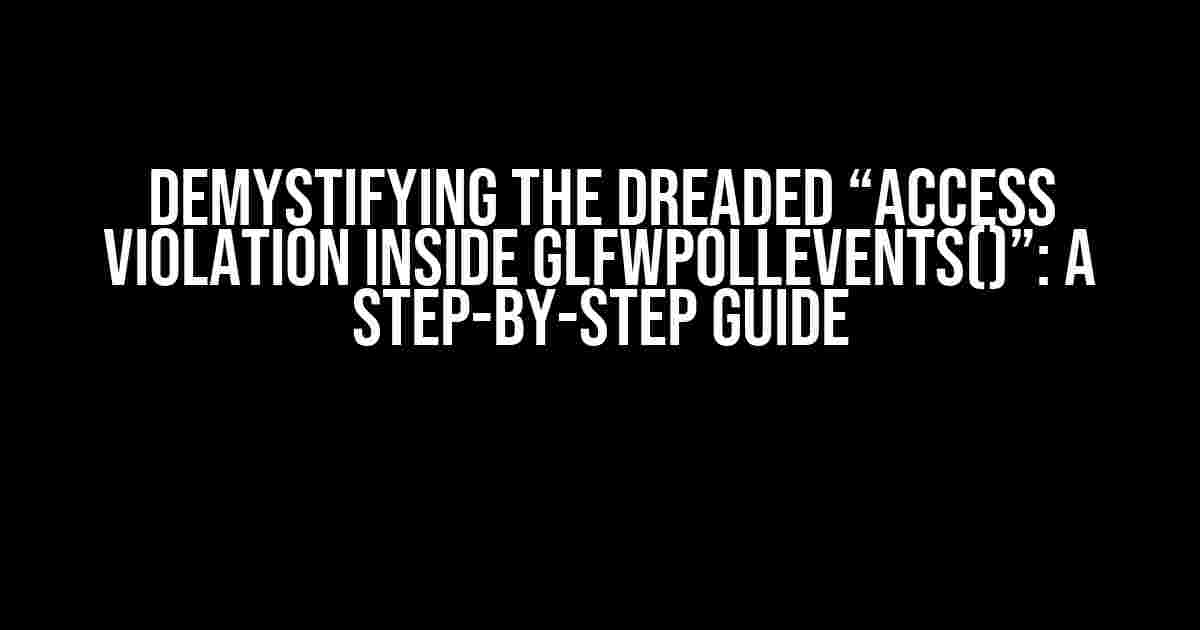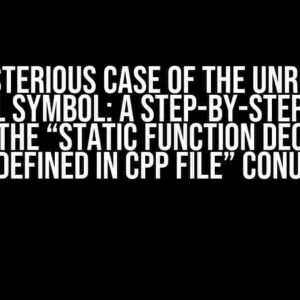Are you tired of staring at the frustrating “Access violation inside glfwPollEvents()” error message, unsure of how to fix it? Do you feel like you’ve tried everything, from reinstalling GLFW to rewriting your entire codebase? Fear not, dear developer, for we’ve got you covered! In this comprehensive guide, we’ll dive into the world of GLFW, identifying the most common causes of this vexing issue and providing clear, actionable solutions to get your project back on track.
Understanding GLFW and its Event Loop
GLFW (Graphics Library Framework) is an open-source, cross-platform library that provides a simple, easy-to-use API for creating windows, handling input, and managing OpenGL contexts. At the heart of GLFW lies its event loop, which is responsible for processing events, such as keyboard and mouse input, window resizes, and other system notifications.
while (!glfwWindowShouldClose(window)) {
glfwPollEvents();
// Game loop logic here
}
The glfwPollEvents() function is a critical component of GLFW’s event loop, responsible for checking and processing events. However, it’s precisely this function that’s prone to throwing the dreaded “Access violation inside glfwPollEvents()” error. But why does this happen?
Common Causes of the “Access Violation Inside GLFWPollEvents()” Error
Don’t worry; we’ve got a list of common culprits that might be causing this error. Let’s investigate each one:
- Null or Invalid Window Pointer: Are you passing a null or invalid window pointer to
glfwPollEvents()? Make sure you’ve created a valid window usingglfwCreateWindow()and passed the correct pointer to the function. - Incompatible GLFW Version: You might be using an outdated or incompatible version of GLFW. Ensure you’re running the latest version or one that’s compatible with your system and compiler.
- Thread Safety Issues: GLFW is not thread-safe by default. If you’re using multiple threads, ensure you’re using the
GLFW_THREAD_SAFEhint or taking other necessary measures to avoid thread conflicts. - Incorrect Event Callbacks: Have you registered event callbacks using
glfwSet*functions (e.g.,glfwSetKeyCallback())? Make sure you’re passing valid function pointers and handling events correctly. - Memory Corruption or Leaks: If your program is experiencing memory corruption or leaks, it can lead to the “Access violation inside glfwPollEvents()” error. Use memory debugging tools like Valgrind or AddressSanitizer to identify and fix issues.
- Conflicting Libraries or Frameworks: Are you using other libraries or frameworks that might be conflicting with GLFW? Try isolating your GLFW code or using a compatibility layer to resolve issues.
- OpenGL Context Issues: If your OpenGL context is not properly created or managed, it can cause the error. Verify your OpenGL context creation and management code.
Troubleshooting the “Access Violation Inside GLFWPollEvents()” Error
Now that we’ve covered the common causes, let’s walk through a step-by-step troubleshooting process:
- Check Your Window Pointer: Verify that your window pointer is valid and not null. Use a debugger or logging statements to confirm.
- Verify GLFW Version: Ensure you’re using the latest version of GLFW or one that’s compatible with your system and compiler.
- Review Event Callbacks: Check your event callback registrations and ensure you’re passing valid function pointers and handling events correctly.
- Test Thread Safety: If you’re using multiple threads, try disabling thread safety or implementing thread-safe measures to rule out thread conflicts.
- Run Memory Debugging Tools: Use tools like Valgrind or AddressSanitizer to identify and fix memory corruption or leaks.
- Isolate GLFW Code: Try isolating your GLFW code to identify if another library or framework is causing the conflict.
- Verify OpenGL Context: Verify your OpenGL context creation and management code to ensure it’s properly initialized and managed.
Real-World Examples and Solutions
Let’s take a look at some real-world examples and solutions to help solidify your understanding:
// Example 1: Null Window Pointer
glfwWindow* window = nullptr;
glfwPollEvents(); // << Error! Null window pointer
// Solution:
glfwWindow* window = glfwCreateWindow(800, 600, "My Window", nullptr, nullptr);
if (!window) {
// Handle window creation failure
}
glfwPollEvents(); // << Correct window pointer
// Example 2: Incompatible GLFW Version
// Using GLFW 3.2 with a GLFW 3.3-compatible compiler
glfwInit(); // << Error! Incompatible version
// Solution:
// Use GLFW 3.3 or update the compiler to match the GLFW version
glfwInit(); // << Correct version
These examples demonstrate how common mistakes can lead to the “Access violation inside glfwPollEvents()” error. By following the troubleshooting steps and reviewing the real-world examples, you should be able to identify and fix the issue in your own project.
Conclusion
In conclusion, the “Access violation inside glfwPollEvents()” error can be a frustrating and daunting issue, but by understanding the common causes and following a methodical troubleshooting process, you can identify and fix the problem. Remember to:
- Verify your window pointer and GLFW version
- Review event callbacks and thread safety
- Run memory debugging tools to identify memory issues
- Isolate GLFW code to identify conflicts
- Verify OpenGL context creation and management
By following these steps and keeping your GLFW knowledge sharp, you’ll be well-equipped to tackle even the most obscure errors and get your project back on track in no time!
| Common Causes | Solutions |
|---|---|
| Null or Invalid Window Pointer | Verify window creation and pass valid pointer |
| Incompatible GLFW Version | Update GLFW or use compatible version |
| Thread Safety Issues | Use GLFW_THREAD_SAFE hint or implement thread-safe measures |
| Incorrect Event Callbacks | Verify event callback registrations and handling |
| Memory Corruption or Leaks | Use memory debugging tools to identify and fix issues |
| Conflicting Libraries or Frameworks | Isolate GLFW code or use compatibility layer |
| OpenGL Context Issues | Verify OpenGL context creation and management |
Remember, with patience, persistence, and a solid understanding of GLFW, you’ll be well on your way to resolving the “Access violation inside glfwPollEvents()” error and creating amazing, GLFW-powered projects!
Frequently Asked Question
Get answers to your burning questions about “Access violation inside glfwPollEvents()!”
What is an access violation inside glfwPollEvents()?
An access violation inside glfwPollEvents() occurs when your program tries to access memory that it’s not allowed to, often due to a pointer or variable being misused. This can happen when using the GLFW library, particularly when handling events with glfwPollEvents().
What are the common causes of access violations inside glfwPollEvents()?
Common causes include null or dangling pointers, incorrect buffer sizes, and mismatched library versions. Make sure your GLFW library is up-to-date and that you’re using the correct compiler settings. Also, double-check your code for any potential memory leaks or unauthorized memory accesses.
How do I debug an access violation inside glfwPollEvents()?
To debug, try enabling debug output in GLFW using glfwSetErrorCallback() to catch any error messages. You can also use a debugger like gdb or Visual Studio to step through your code and identify the exact line causing the issue. Additionally, review your code for any potential memory-related issues.
Can I prevent access violations inside glfwPollEvents() by using smart pointers?
Yes, using smart pointers like unique_ptr or shared_ptr can help prevent access violations by automatically managing memory and preventing dangling pointers. However, it’s essential to ensure that you’re using smart pointers correctly and not introducing new issues.
Are there any workarounds for access violations inside glfwPollEvents()?
If you’re stuck with an older version of GLFW, you can try using glfwWaitEvents() instead of glfwPollEvents(), which might help avoid the issue. However, this is not a substitute for fixing the underlying problem, and you should still investigate and resolve the root cause of the access violation.



